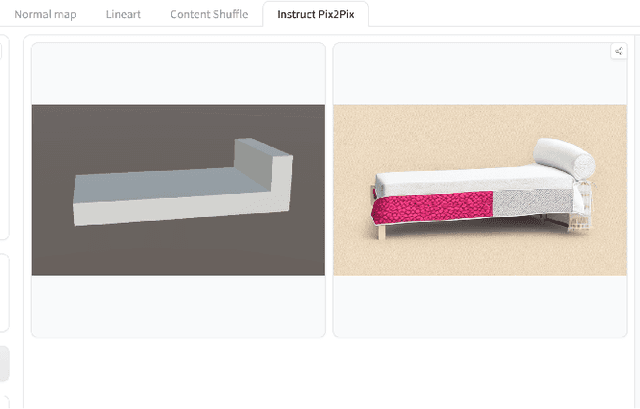Yukun Song
2024 NASA SUITS Report: LLM-Driven Immersive Augmented Reality User Interface for Robotics and Space Exploration
Jul 01, 2025Abstract:As modern computing advances, new interaction paradigms have emerged, particularly in Augmented Reality (AR), which overlays virtual interfaces onto physical objects. This evolution poses challenges in machine perception, especially for tasks like 3D object pose estimation in complex, dynamic environments. Our project addresses critical issues in human-robot interaction within mobile AR, focusing on non-intrusive, spatially aware interfaces. We present URSA, an LLM-driven immersive AR system developed for NASA's 2023-2024 SUITS challenge, targeting future spaceflight needs such as the Artemis missions. URSA integrates three core technologies: a head-mounted AR device (e.g., HoloLens) for intuitive visual feedback, voice control powered by large language models for hands-free interaction, and robot tracking algorithms that enable accurate 3D localization in dynamic settings. To enhance precision, we leverage digital twin localization technologies, using datasets like DTTD-Mobile and specialized hardware such as the ZED2 camera for real-world tracking under noise and occlusion. Our system enables real-time robot control and monitoring via an AR interface, even in the absence of ground-truth sensors--vital for hazardous or remote operations. Key contributions include: (1) a non-intrusive AR interface with LLM-based voice input; (2) a ZED2-based dataset tailored for non-rigid robotic bodies; (3) a Local Mission Control Console (LMCC) for mission visualization; (4) a transformer-based 6DoF pose estimator (DTTDNet) optimized for depth fusion and real-time tracking; and (5) end-to-end integration for astronaut mission support. This work advances digital twin applications in robotics, offering scalable solutions for both aerospace and industrial domains.
Focus on Local: Finding Reliable Discriminative Regions for Visual Place Recognition
Apr 14, 2025Abstract:Visual Place Recognition (VPR) is aimed at predicting the location of a query image by referencing a database of geotagged images. For VPR task, often fewer discriminative local regions in an image produce important effects while mundane background regions do not contribute or even cause perceptual aliasing because of easy overlap. However, existing methods lack precisely modeling and full exploitation of these discriminative regions. In this paper, we propose the Focus on Local (FoL) approach to stimulate the performance of image retrieval and re-ranking in VPR simultaneously by mining and exploiting reliable discriminative local regions in images and introducing pseudo-correlation supervision. First, we design two losses, Extraction-Aggregation Spatial Alignment Loss (SAL) and Foreground-Background Contrast Enhancement Loss (CEL), to explicitly model reliable discriminative local regions and use them to guide the generation of global representations and efficient re-ranking. Second, we introduce a weakly-supervised local feature training strategy based on pseudo-correspondences obtained from aggregating global features to alleviate the lack of local correspondences ground truth for the VPR task. Third, we suggest an efficient re-ranking pipeline that is efficiently and precisely based on discriminative region guidance. Finally, experimental results show that our FoL achieves the state-of-the-art on multiple VPR benchmarks in both image retrieval and re-ranking stages and also significantly outperforms existing two-stage VPR methods in terms of computational efficiency. Code and models are available at https://github.com/chenshunpeng/FoL
AI-Driven Stylization of 3D Environments
Nov 09, 2024



Abstract:In this system, we discuss methods to stylize a scene of 3D primitive objects into a higher fidelity 3D scene using novel 3D representations like NeRFs and 3D Gaussian Splatting. Our approach leverages existing image stylization systems and image-to-3D generative models to create a pipeline that iteratively stylizes and composites 3D objects into scenes. We show our results on adding generated objects into a scene and discuss limitations.
AR Overlay: Training Image Pose Estimation on Curved Surface in a Synthetic Way
Sep 22, 2024



Abstract:In the field of spatial computing, one of the most essential tasks is the pose estimation of 3D objects. While rigid transformations of arbitrary 3D objects are relatively hard to detect due to varying environment introducing factors like insufficient lighting or even occlusion, objects with pre-defined shapes are often easy to track, leveraging geometric constraints. Curved images, with flexible dimensions but a confined shape, are essential shapes often targeted in 3D tracking. Traditionally, proprietary algorithms often require specific curvature measures as the input along with the original flattened images to enable pose estimation for a single image target. In this paper, we propose a pipeline that can detect several logo images simultaneously and only requires the original images as the input, unlocking more effects in downstream fields such as Augmented Reality (AR).
Causal Multi-Label Feature Selection in Federated Setting
Mar 11, 2024Abstract:Multi-label feature selection serves as an effective mean for dealing with high-dimensional multi-label data. To achieve satisfactory performance, existing methods for multi-label feature selection often require the centralization of substantial data from multiple sources. However, in Federated setting, centralizing data from all sources and merging them into a single dataset is not feasible. To tackle this issue, in this paper, we study a challenging problem of causal multi-label feature selection in federated setting and propose a Federated Causal Multi-label Feature Selection (FedCMFS) algorithm with three novel subroutines. Specifically, FedCMFS first uses the FedCFL subroutine that considers the correlations among label-label, label-feature, and feature-feature to learn the relevant features (candidate parents and children) of each class label while preserving data privacy without centralizing data. Second, FedCMFS employs the FedCFR subroutine to selectively recover the missed true relevant features. Finally, FedCMFS utilizes the FedCFC subroutine to remove false relevant features. The extensive experiments on 8 datasets have shown that FedCMFS is effect for causal multi-label feature selection in federated setting.
 Add to Chrome
Add to Chrome Add to Firefox
Add to Firefox Add to Edge
Add to Edge